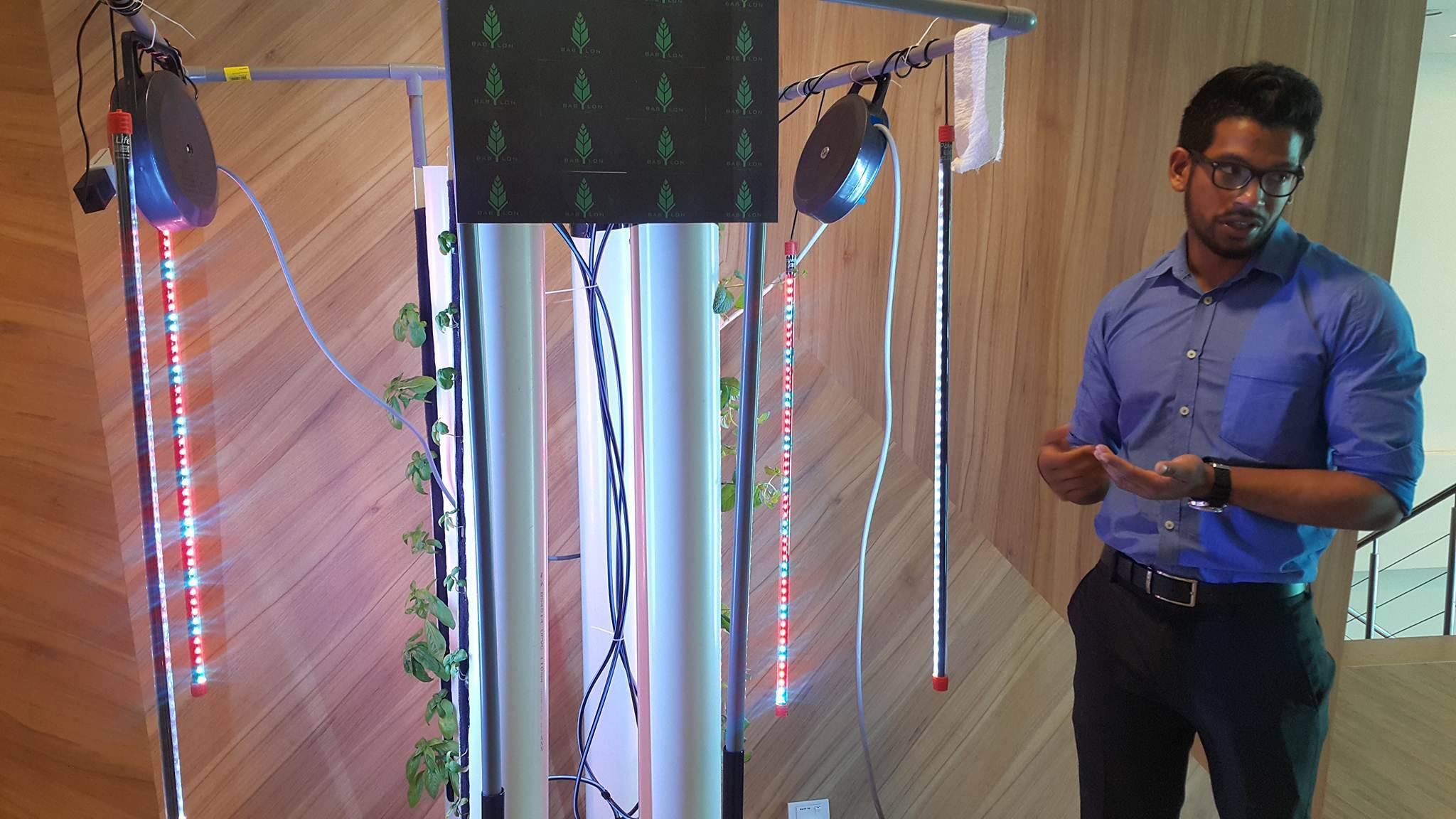It all began because of an exceptionally dull class in financial reporting. Stuart Thomas was idly browsing Facebook when he came across an article on bigthink.com on the “Next 5 Trillion Dollar Industries”. One of the industries listed was vertical farming and Stuart found himself drawn to it because of its potential to impact both first world countries and impoverished nations. Thus the idea for Babylon Vertical Farms was born.
He recruited two of his friends, Joel, who now handles marketing and Abang who takes charge of operations and production. A little later, they were joined by Eshton who does the sales and Oliver who handles engineering and tech. Stuart himself is in charge of finance and strategy.
More Than Simple Hydroponics

The team’s prototype vertical grow tower is a four tower module and each tower can be optimised to hold 12 plants as opposed to one plant otherwise grown horizontally.
According the team, “Our solution is targeted to reducing harvest-to-plate time to less than six hours compared to the industry average of 18 hours. This can be achieved through the creation of an indoor vertical hydroponic farm located in the city.
Growing plants via this method allows the crop to be cultivated in a controlled environment, eliminates the use of pesticides and maximises water efficiency. As all elements within this facility is controlled and monitored closely, harvest per year can be increased.”
Stuart added, “When you take it down to the physics of it, vertical farming is a no brainer cause of its huge increase in not only produce growth efficiency, but water efficiency. Our system can use 6 weeks’ worth of water used for regular soil farming and make it last up to a whole year.”
At this stage, their products are mostly herbs, such as sweet basil and mint. According to Stuart, the produce is exposed to a minimum of 12 hours of LED purple light. He explained that purple light is the best light for plants, not because it is UV (Ultra violet) but because the combination of red and blue wavelengths is optimal. This coloured light barely gives off heat due to the LED techonology, which allows the plants to grow as close to the light as possible.
The team also added that the plants grown are pesticide free, GM (genetically modification) free and they are fairly clean because they are not exposed to soil or insects and bugs of any kind.
For now, the plants grown on the towers are mostly herbs, though the team hopes to venture out and eventually provide fruits and vegetables.
They have experimented with growing bak choi (Chinese cabbage) before, but Stuart explained, “Due to its low turnover harvest rates and since it is a low dollar crop, we dropped it, and decided to venture into high dollar herbs. We will only grow these herbs at least until we are financially stable. We plan to grow barley, many other types of herbs, lettuce, cherry tomatoes and even strawberries and raspberries in our farm in the middle of the Klang Valley.”
Overcoming Obstacles

Consumers might also be interested in if plants grown through this method are any different from plants grown with more conventional methods. Stuart was adamant that there are no harmful side effects.
He clarified, “We do not genetically modify any of our seeds or our produce. It’s simple, the way we treat our plants is how millionaires live a luxurious lifestyle, imagine yourself permanently living in a 5 star penthouse with an all day buffet in the kitchen EVERYDAY, who wouldn’t be happy?
There is a comfortable bed, 24 hour access to quality nutrient food and of course being indoors will protect from the heat and rain. With that kind of hospitality, our plants can grow comfortably and focus on growing rather than surviving. That is how we nurture our plants, we love to spoil them so they grow big and healthy in no time so people can always eat the best produce as frequently as possible.”

The team has big ambitions of setting up an urban farm in a building somewhere in the Klang Valley by the end of the year, but of course, that comes with its own set of challenges. “The farm is expected to churn out almost 1,000 kg of produce a month in only a 1,600 sqft office unit. We need funds first to conduct renovations to build the farm before any produce can be grown on a reasonable enough scale.
To date we’ve been going around getting restaurants to be our early adopters. We’ve got 53 under our belt already with more than half of them wanting a supplier that’s less than 30km from them and provides soil free produce combined with a super low harvest to plate time.”
It’s clear that there is a demand for their product, but they first need to get it off the ground. However, Stuart shared, “Babylon isn’t planning to change its business model even though we haven’t received any funding yet. We firmly believe that our business model allows us to have a lower customer acquisition cost along with stronger recurring revenue.”
The startup is aiming to launch by March or April next year. They still require seed financing of Rm500 000, mostly to build the farm in the city.
At the moment, they’re still actively seeking out partnerships to help supplement revenue for their growth as a startup, and their marketing strategies are heavily focused on signing up as many restaurants as possible to sell their produce to.










